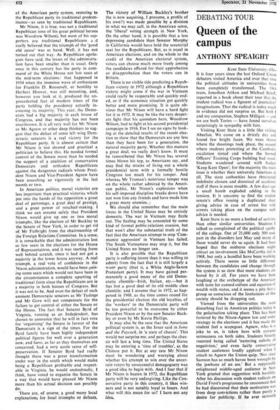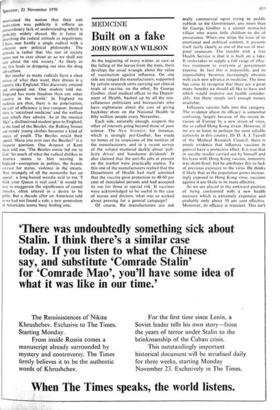DEBATING TOUR
Queen of the campus
ANTHONY SPEAIGHT
Kent State University, Ohio It is four years since the last Oxford Union debaters visited America and over that time the political attitudes in universities have been completely transformed. The 1964 team, Jonathan Aitken and Michael Beloff, reported in a book about their tour that the student radical was a figment of journalists' imaginations. That the radical is today much in evidence did not surprise us. But both I and my companion, Stephen Milligan — and we are both Tories — have found ourselves surprisingly in sympathy with him.
Visiting Kent State is a little like visiting Aberfan. We came on a drizzly day and found few bright faces. We were shown where the shootings took place, the mound where students protesting at the Cambodia escalation rioted and where the burned Officers' Training Corps building had stood.
Students wandered around with badges `Keep Kent Open'; for the majority the main issue is whether their university functions at all. The state authorities have threatened indefinite closure and dismissal of academic staff if there is more trouble. A few days ago a small bomb exploded adding to the tension. It is uncanny to find the student senate's office issuing a duplicated sheet giving advice in case of arrest but with arrests taking place on the campus such advice is needed.
Kent State is no more a hotbed of activists than other similar universities. Students I talked to complained of the political apathy of the college. Out of 21,000 only 500 took part in the disorders last May and many of those would never do so again. It had been hoped that the midterm elections might attract an involvement like McCarthy did in 1968, but only a handful have been working actively. There seems so little difference between the candidates and change through the system is so slow that most students are bored by it all. For years we have been laughing at the archetype of the American with taste for canned culture and equation of wealth with status, and it seems a pity that a group so conscious of the limitations of this society should be dropping out.
Viewed from the universities the most disturbing fact in American politics today is the polarisation taking place. This has been fostered by the Nixon-Agnew law and order strategy in the elections and it has made the student feel a scapegoat. Agnew, who is a joke to us, is taken here with extreme seriousness on both sides. Students bitterly resented being called 'nattering nabobs of negativism,' and even fairly conservative student audiences loudly applaud when I attach to Agnew the Union quip, `Not since Samson has so much havoc been wrought by the jawbone of an ass.' But a supposedly enlightened middle-aged audience in New York greeted that suggestion with hostility. After his discussion with student radicals ou David Frost's programme he announced that he had discovered that their motivation was from deep convictions rather than purely a Jdesire for publicity. If he ever seriously entertained the notion that their sole motivation was publicity it reflects an extraordinary lack of understanding which is probably widely shared. He is fairer in describing the radical attitude as negativism; I have met hardly a single radical with a coherent new political philosophy. The attitude is rather that 'the rest of society seems not to care about us so we shall not care about the rest society.' As likely as not this leads to dropping out into the drug sub-culture.
But insofar as many radicals have a clear notion of what they want, their dream is a country like England. This discovery amazed and intrigued me. One student told me, 'England has more freedom than any other country in the world' In England no students are shot, there is no polarisation, the cult of efficiency is less rampant. Instead there is 'socialised medicine' and the welfare state which they admire. As in the musical 'Hair' a disillusioned student goes to England, so the land of the Beatles, the Rolling Stones and trendy young clothes becomes a kind of mecca of youth. The Beatles retain their appeal. 'Have you ever met the Beatles?' is a frequent question. One dropout at Kent State told me, 'The Beatles music led me to God.' So much of what the radical dislikes in America seems to him missing in England—corruption in politics, the frantic rat-race for status, violence in the streets. Most strangely of all the monarchy has an appeal : a long-haired weirdie said to me, 'I think your Queen is real cool? It would be easy to exaggerate the significance of casual remarks, often uttered in a .desire to be polite. But a decade after an American told us we had not found a role, a new generation of Americans seems busy finding one.















































 Previous page
Previous page